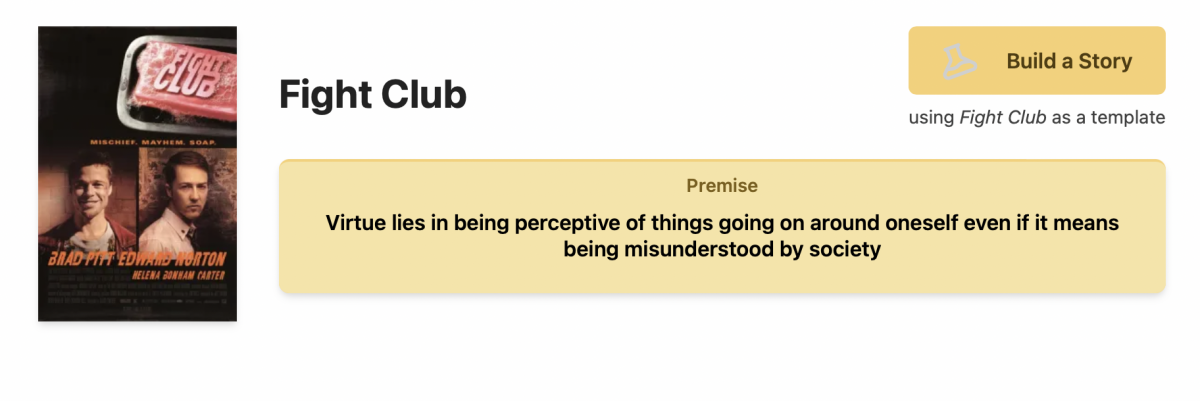
Fight Club
It's only after we've lost everything that we're free to do anything.
In Fight Club, the Dramatic Argument is between Aware (Narrator) and Self-aware (Tyler Durden).
The film argues the virtue of being intensely perceptive of everything going on around you, even if it means being completely misunderstood by the rest of society.
Virtue lies in being perceptive of things going on around oneself even if it means being misunderstood by society.
While it is true that the first rule of Fight Club is not to talk about it, the real purpose and driving force behind the exclusive organization is greater self-awareness...
...a point-of-view vehemently argued by Brad Pitt's character Tyler Durden:
"Man, I see in Fight Club the strongest and smartest men who've ever lived. I see all this potential, and I see squandering. God damn it, an entire generation pumping gas, waiting tables; slaves with white collars. Advertising has us chasing cars and clothes, working jobs we hate so we can buy shit we don't need. We're the middle children of history, man. No purpose or place. We have no Great War. No Great Depression. Our Great War's a spiritual war... our Great Depression is our lives. We've all been raised on television to believe that one day we'd all be millionaires, and movie gods, and rock stars. But we won't. And we're slowly learning that fact. And we're very, very pissed off."
The subtext beneath those powerful words is a motivation of Self-aware--inwardly focusing on how our "Great Depression" is our lives.
On the other side of the argument sits Edward Norton's Narrator, a name-less character who looks outwardly for self-definition:
Like so many others, I had become a slave to the IKEA nesting instinct...If I saw something clever like a little coffee table in the shape of a yin-yang, I had to have it. The Klipske personal office unit, the Hovetrekke home exer-bike, or the Johannshamn sofa with the Strinne green stripe pattern. Even the Rizlampa wire lamps of environmentally friendly unbleached paper. I’d flip through catalogs and wonder: What kind of dining set defines me as a person? I had it all. Even the glass dishes with tiny bubbles and imperfections.
How does the he argue for Awareness in the story?
The Narrator's purpose with the above scene and other similar ones (including the insurance actuary scene) is to communicate the existential dread of having everything we've been told to want, yet still feeling empty inside.
Our focus on the external (a motivation of Aware) leads nowhere.
Arguing for Virtue
Because the argument of Fight Club is one of virtue, the Plot must fail, which means the personal Main Character Throughline (the Narrator) needs to be driven by the dynamic pair to their Plot element. In Fight Club, this would mean the Narrator's personal Problem element should be Self-aware.
But wait...didn't I just say he was arguing on the side of Aware?
In the Plot, yes. In terms of Character, no.
Arguing for Virtue
This is where most writers get confused when it comes to understanding the Dramatic Argument of a story that argues something virtuous.
Character and Plot must diverge in a story of virtue. The split is what communicates the bittersweet argument essential to a virtuous point-of-view. The failure to resolve the external Plot and the emotional fulfillment of the Character Throughline is the virtuous aspect of the story, which requires the two perspectives to split the Dramatic Argument.
The Narrator's personal issue is that he has ZERO Self-awareness (he's really Tyler Durden). That existential dread spoken of before is part of the Main Character Throughline, the subjective emotional part of the story (motivated by a lack of Self-aware).
The focus on external factors is the Narrator's role in the Objective Story Plot. The focus on the absurdity of modern life to the exclusion of one's self-perception is the core argument of the film: basing your self-identity on eternal indicators that are both manufactured and unreal masks one's true identity.
Making the Argument
In the end, both Character and Plot exchange places such that the Narrator becomes personally Aware of Tyler Durden's true identity and what has been going on with his sleepless nights and Project Mayhem ("You caught me at a very bad time").
By shooting himself, the Narrator removes the existential dread and feelings of loneliness arising from Awareness from the bigger picture--allowing the self-deluded machinations of Tyler Durden to persist.
(The Antagonist of the Plot "wins").
Self-awareness prevails—the final image of those buildings crumbling to the ground is the result of removing those trappings of Awareness (our Great Depression) from sight, easing existential dread with great financial cost.
Altering the Argument
What would the story be like if the Narrator hadn't shot himself?
If, instead, the Narrator had continued to define himself by these external indicators, he would have found a way to integrate into modern society by accepting his IKEA-formed personality and embrace advertising as a means of defining happiness.
...but, that would've been a different story altogether. 😊
Download the FREE e-book Never Trust a Hero
Don't miss out on the latest in narrative theory and storytelling with artificial intelligence. Subscribe to the Narrative First newsletter below and receive a link to download the 20-page e-book, Never Trust a Hero.


